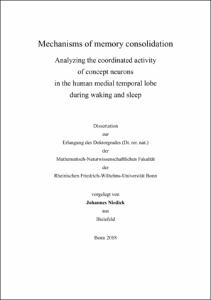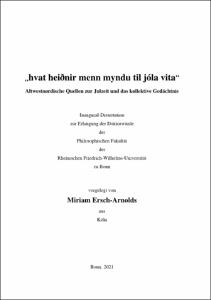Niediek, Johannes: Mechanisms of memory consolidation : Analyzing the coordinated activity of concept neurons in the human medial temporal lobe during waking and sleep. - Bonn, 2018. - Dissertation, Rheinische Friedrich-Wilhelms-Universität Bonn.
Online-Ausgabe in bonndoc: https://nbn-resolving.org/urn:nbn:de:hbz:5n-52931
Online-Ausgabe in bonndoc: https://nbn-resolving.org/urn:nbn:de:hbz:5n-52931
@phdthesis{handle:20.500.11811/7686,
urn: https://nbn-resolving.org/urn:nbn:de:hbz:5n-52931,
author = {{Johannes Niediek}},
title = {Mechanisms of memory consolidation : Analyzing the coordinated activity of concept neurons in the human medial temporal lobe during waking and sleep},
school = {Rheinische Friedrich-Wilhelms-Universität Bonn},
year = 2018,
month = dec,
note = {The aim of this thesis is to investigate the role of human concept neurons in memory consolidation during sleep. Memory consolidation is a process by which memories initially dependent on the hippocampus are transferred to cortical areas, thereby gradually becoming independent of the hippocampus. Theories of memory consolidation posit that memory traces encoding autobiographic episodes are rapidly formed in the hippocampus during waking, and reactivated during subsequent slow-wave sleep to be transformed into a long-lasting form. Concept neurons in the human medial temporal lobe are neurons tuned to semantic concepts in a selective, sparse, and invariant manner. These neurons respond to pictures or written and spoken words representing their preferred concept (for example, a person, an animal, an object), regardless of physical stimulus properties. Concept neurons have been speculated to be building blocks for episodic memory. We used whole-night recordings from concept neurons in the medial temporal lobe of epilepsy patients implanted with depth electrodes for presurgical monitoring to test the hypothesis that the coordinated activity of concept neurons during sleep is a neurophysiological correlate of memory consolidation in humans. To conduct this study, we developed software methods for artifact removal and spike sorting of long-term recordings from single neurons. In an evaluation on both simulated model data and visual stimulus presentation experiments, our software outperformed previous methods. Starting from the conceptual analogy between rodent place cells and human concept neurons, we developed an episodic memory task in which participants learned a story eliciting sequential activity in concept neurons. We found that concept neurons preserved their semantic tuning across whole-night recordings. Hippocampal concept neurons had, on average, lower firing rates during rapid-eye-movement (REM) sleep than during waking. During slow-wave sleep, firing rates did not significantly differ from waking. The activity of concept neurons increased during ripples in the local field potential. Furthermore, concept neurons whose preferred stimuli participated in the memorized story were conjointly reactivated after learning, most pronouncedly during slow-wave sleep. Cross-correlations of concept neurons were most asymmetric during slow-wave sleep. Cross-correlation peak times were often in the range believed to be relevant for spike-timing-dependent plasticity. However, time lags of peak cross-correlations did not correlate with the positional order of stimuli in the memorized story. Our findings support the hypothesis that concept neurons rapidly encode a memory trace during learning, and that the reactivation of the same neurons during subsequent slow-wave sleep and ripples contributes to the consolidation of the memory episode. However, the consolidation of the temporal order of events in humans appears to differ from what rodent research suggests.},
url = {https://hdl.handle.net/20.500.11811/7686}
}
urn: https://nbn-resolving.org/urn:nbn:de:hbz:5n-52931,
author = {{Johannes Niediek}},
title = {Mechanisms of memory consolidation : Analyzing the coordinated activity of concept neurons in the human medial temporal lobe during waking and sleep},
school = {Rheinische Friedrich-Wilhelms-Universität Bonn},
year = 2018,
month = dec,
note = {The aim of this thesis is to investigate the role of human concept neurons in memory consolidation during sleep. Memory consolidation is a process by which memories initially dependent on the hippocampus are transferred to cortical areas, thereby gradually becoming independent of the hippocampus. Theories of memory consolidation posit that memory traces encoding autobiographic episodes are rapidly formed in the hippocampus during waking, and reactivated during subsequent slow-wave sleep to be transformed into a long-lasting form. Concept neurons in the human medial temporal lobe are neurons tuned to semantic concepts in a selective, sparse, and invariant manner. These neurons respond to pictures or written and spoken words representing their preferred concept (for example, a person, an animal, an object), regardless of physical stimulus properties. Concept neurons have been speculated to be building blocks for episodic memory. We used whole-night recordings from concept neurons in the medial temporal lobe of epilepsy patients implanted with depth electrodes for presurgical monitoring to test the hypothesis that the coordinated activity of concept neurons during sleep is a neurophysiological correlate of memory consolidation in humans. To conduct this study, we developed software methods for artifact removal and spike sorting of long-term recordings from single neurons. In an evaluation on both simulated model data and visual stimulus presentation experiments, our software outperformed previous methods. Starting from the conceptual analogy between rodent place cells and human concept neurons, we developed an episodic memory task in which participants learned a story eliciting sequential activity in concept neurons. We found that concept neurons preserved their semantic tuning across whole-night recordings. Hippocampal concept neurons had, on average, lower firing rates during rapid-eye-movement (REM) sleep than during waking. During slow-wave sleep, firing rates did not significantly differ from waking. The activity of concept neurons increased during ripples in the local field potential. Furthermore, concept neurons whose preferred stimuli participated in the memorized story were conjointly reactivated after learning, most pronouncedly during slow-wave sleep. Cross-correlations of concept neurons were most asymmetric during slow-wave sleep. Cross-correlation peak times were often in the range believed to be relevant for spike-timing-dependent plasticity. However, time lags of peak cross-correlations did not correlate with the positional order of stimuli in the memorized story. Our findings support the hypothesis that concept neurons rapidly encode a memory trace during learning, and that the reactivation of the same neurons during subsequent slow-wave sleep and ripples contributes to the consolidation of the memory episode. However, the consolidation of the temporal order of events in humans appears to differ from what rodent research suggests.},
url = {https://hdl.handle.net/20.500.11811/7686}
}









